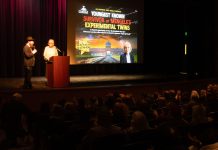Gilroy family honored for volunteerism
Gilroy – Everyone knew Louie Sandoval. He was hard to miss: a husky man with a bristly, outsize mustache and a boundless crop of curls. On Saturdays, he stole a few hours alone with his wife Stella. They’d slip away to the First Street Starbucks for coffee, far from the din of his San Jose body shop, away from their four children and his myriad commitments.
But somehow, the Sandovals always ran into someone they knew, someone who’d stop, and want to talk.
The trouble was, everyone knew Louie: The wayward teenagers he steered back toward school. The men he counseled at Cry Out Christian Fellowship. The down-and-out, whose cars he fixed up for free, and the upstanding, who he served with on a dizzying number of boards. His family became their family, his home their home. Teenagers flocked to their cozy barbecues, drawn not by alcohol or ruckus – both absent – but by Louie and soft-voiced Stella, and their open-hearted kids, who didn’t care where you came from or what you owned.
In September, the Sandovals won the La Familia Award, a select honor from the Hispanic Foundation of Silicon Valley. It’s a fitting honor: a year after Louie’s death, his family is still Gilroy’s family. Stella still takes at-risk teens on trips to Disneyland and deep-sea fishing, as Louie began doing six years ago. Her children, Louis Jr., Monica, Lorenzo and Lucas volunteer hours on end at Hispanic Chamber events and the Gilroy Garlic Festival, sometimes single-handedly staffing its hospitality area, now named ‘Louie’s Kitchen.’ Stella’s parents, Alice and Gilbert Garza, serve up home-cooked food to volunteers at the Hispanic Chamber’s fireworks booth, supporting Gilroy High’s college-bound Hispanic seniors.
“I used to say to him, ‘Louie, your kids are so generous with their time,’ ” recalled Eleanor Villarreal, who met him in 1998, through the Hispanic Chamber of Commerce. “He said, ‘If they want to live in my house, that’s what they do.'”
Daughter Monica said, “Volunteering was natural for us — we had such a good leader.” It’s only in the past few years, said the 25-year-old graduate student, that she realized that not everyone does it.
Louie’s legacy is alive in his family, but it’s still difficult to speak of him, said Liz Murillo. She met Louie as a 12-year-old, a “challenging child”; as a teenager at odds with her mother, she’d sometimes crash at the Sandoval’s place. Louie called her his daughter.
“When he passed away,” said Murillo, “I felt like I lost my dad. I lost a part of my life when I lost him.”
He put kids at ease with his no-nonsense manner, said Jorge Landeros, who met Louie in high school, and went on the trips he organized. Once, as Landeros snowboarded down a hill, Louie quipped, “Good job, but that 12-year-old girl did it better.”
In return, they’d tease him about his poor Spanish and his sky-high, Afro-like curls. When he dealt tough love, he’d cross his football-player’s arms, Murillo recalled, and deliver one of his dry one-liners. He talked to teens like adults, to Landeros “man-to-man.”
But he knew where troubled teens came from: one of a sprawling family of 14 in San Jose, he grew up poor, and met Stella while cutting apricots one summer in the fields. His talent for car repair and restoration won him a first place prize in a state competition, and led to a shop of his own, L&M, which he opened in 1982.
“Talk about a pull-yourself-up-by-the-bootstraps story,” said Villareal.
Yet Louie’s ego never inflated, and he never neglected his wife or his family. Every Saturday, he’d bring Stella flowers from the farmers’ market in Morgan Hill. He once quoted the Bible on love, recalled Villareal, and said simply, “That’s Stella.”
If you asked Louie to do something, said Robert Rodriguez, who first worked with him on the Restorative Justice Program, he’d scoff, “Yeah, right,” like a line from a sitcom. But look inside his pantry, and you’d find a calendar listing his many commitments, Xs starring the page, dates and times jostling for space. Some nights, Stella recalled, he’d open the cupboard and exclaim, “Oh, my gosh,” realizing he was supposed to be elsewhere.
He was two-term president of the Hispanic Chamber, a four-year Garlic Festival Committee chair, and a three-year board member of the Restorative Justice Program. He served on the boards of the Gilroy Gang Task Force, Bonfante Gardens, and the Downtown Development Corporation. His trips for at-risk youth took hundreds of teenagers to Lake Tahoe, Magic Mountain and Six Flags. He was honored by Congressman Mike Honda, and his business soared.
“You can talk to people for hours about this man,” Murillo said, and began to sob.
And when he died of an aneurysm at age 50, people did talk, for hours on end. On a frigid January night, they huddled outside South Valley Christian Church, clamoring to testify to his generosity and his expansive heart. The church was packed, said Martha Martinez, president of the Hispanic Chamber of Commerce, and people poured from the building onto the street. His mourners were of every age, and every color: churchgoers, city leaders, auto mechanics, teens, civic leaders, and, of course, friends.
On that day, the church wasn’t big enough for their grief.
The only thing missing was Louie’s mustache, shaved peremptorily at the funeral home. As they swarmed into the packed church, mourners murmured, “What happened to Louie?”
“He wasn’t the same without that thick thing,” said Stella, smiling. He’d shaved it only once in his lifetime, she said, when their first son, Louie Jr., was born. He didn’t want to scrape the boy as he kissed him.
As reporters and television cameras flock to Stella and her children, asking about their prestigious award, she sometimes feels overwhelmed. On Oct. 21, she’ll attend the 17th Annual Hispanic Charity Ball to accept the honor. She’s thrilled, but the limelight is unfamiliar, and the spotlight intense.
“Louie did all the speaking,” she said, and then smiled. “Maybe that’s his last joke on me.”













